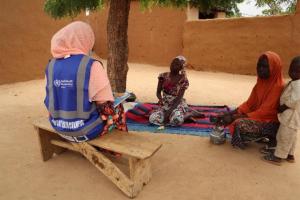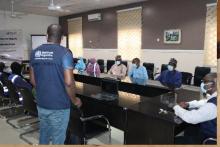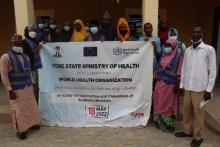Community health champions target over 20,000 households at risk with disease prevention messages in Yobe State
Damaturu, 26 May, 2022 - Bintu Abubakar, a 40 years old community health extension worker (CHEW), a known public health influencer in her locality lives in Potiskum local Government Area (LGA), Yobe State .
Every morning she leaves her home and goes into the community including the Internally Displaced People (IDP) camps to sensitize the residence about infectious diseases and interpersonal health risk messages.
“I go from house to house sensitizing people on personal hygiene, sanitation and the importance of handwashing to protect themselves and families against preventable diseases. I was trained on risk communication messaging. After my training, I have been sensitizing the people in my community and IDPs camps on such diseases as measles, cholera, COVID-19 and importance of vaccination. With the recent monkeypox outbreak reported in some states in Nigeria, I have been sensitizing people about the disease as well, she said
Mrs Abubakar was one of the 20 community health champions trained by the Yobe State Government in collaboration with World Health Organization (WHO).
In Yobe state, community health champions like Mrs. Abubakar are part of the innovative strategy deployed by the state government with support from WHO to empower residents especially vulnerable persons, with preventive messages in order to make informed decision to protect themselves and families. The target is for the champions to reach 20,0000 households with risk communication messages by end of May, 2022.
Buttressing the importance of providing health risk messages to the community, the Yobe state Assistant Director, Health Promotion, Umar Kwanda said “with the emergence of cases of monkeypox, states that have previously never reported it, effective health risk messaging has become an important tool to contain the spread of the disease among the communities and the most vulnerable persons.
In Nigeria a total of 46 suspected monkeypox cases has have been reported between January 1 to April 30 2022. Adamawa state which is bordered with Yobe state has also recorded cases.
Mr Kwanda said interpersonal risk communication plays a pivotal role in curtailing the spread of outbreaks. “The WHO-supported community health champions are doing an incredible job in educating the communities, especially awareness on monkeypox and COVID-19 vaccination. We would continue to collaborate with the WHO to prevent community transmission of these preventable diseases”, he said.
Dr. Ningi Barau, WHO State Coordinator Yobe said, WHO has continued to provide technical support to Yobe state Ministry of Health to curtail outbreaks, including the ongoing CVDPV2.
“WHO won’t relent as part of the WHO Triple Billion targets to improve the health of billions of people by 2023 and WHO will support the state government to achieve this target.
Yobe State is saddled with the humanitarian crisis, including the COVID-19 pandemic. With the support of the WHO and partners, the state has continued to curtail the impact of the pandemic, including the increased cases of measles, and the Circulating Vaccine Derived Polio Virus (CVDPV2).
In collaboration with the European Civil Protection and Humanitarian Aid Operations (ECHO), WHO in northeast Nigeria, continue to support the most vulnerable persons to take informed decisions including capacity building and strengthening of the surveillance system.
Also, WHO and partners are supporting the state in prepration and prevention of diseases outbreaks such as cholera by strategically prepositioning cholera kits across hotspot locations including hard-to-reach areas in readiness for the rainy season.
Technical Contact:
Dr Ningi, Nuhu Barau; Email: ningin [at] who.int (ningin[at]who[dot]int)


